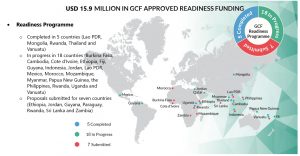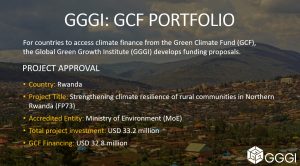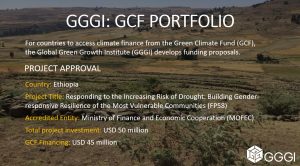Directing finance to where it is needed most
Delivering inclusive growth while limiting climate change to 1.5°C will require the mobilization of finance at a historic scale. Over the next 15 years, it is estimated the world needs about USD 90 trillion in climate smart infrastructure – most of it in developing countries. Investing in green, climate resilient development will help mitigate the impacts of climate change and enable vulnerable societies to adapt to its negative effects. Climate finance plays a vital role in accelerating the implementation of Nationally Determined Contributions (NDCs) and advancing the Sustainable Development Goals (SDGs).
Mobilizing climate finance to where it will deliver the greatest impact is beset by various challenges, including institutional capacity. The Global Green Growth Institute (GGGI), mandated to help develop a low-carbon, resilient world of strong, inclusive and sustainable growth, works with its Member and partner countries to mobilize finance in support of climate action plans and programmes aiming to achieve climate targets.
GGGI has already helped mobilize over USD 1 billion in green investments and climate finance in developing countries. GGGI has done so by supporting countries to tap into finance from diverse sources, including bilateral aid, multilateral development banks, and the private sector.
One critical source of climate finance is the Green Climate Fund (GCF), which empowers developing countries to achieve their NDCs by financing mitigation and adaptation initiatives that align with countries’ needs and priorities. To enhance country ownership and access to its resources, GCF has a Readiness and Preparatory Support Programme. This “Readiness Programme” provides grants or technical assistance to strengthen institutional capacities, governance mechanisms, planning and programming to help countries identify a transformational, long-term climate action agenda. All developing country Parties to United Nations Framework Convention on Climate Change (UNFCCC) can access GCF’s Readiness Programme.
GGGI partners closely with GCF to support developing countries to access climate finance. With a common goal and complementary delivery model, GGGI and GCF signed a Framework Readiness and Preparatory Support Grant Agreement in 2017. Under this strategic partnership, GGGI supports its Member and partner countries to enhance access to GCF financing by implementing the GCF Readiness Programme. To ensure that GGGI remains a neutral advisor to governments, GGGI carries out this work as a Readiness Delivery Partner and is not an accredited entity to GCF.
GGGI supports national designated authorities (NDAs) and existing and potential national direct access entities (DAEs to develop projects for submission to GCF and to access Readiness Programme resources. GGGI also works with partner governments to develop concept notes and funding proposals for submission to GCF.
Over 20 countries have requested GGGI to act as a Readiness Delivery Partner. The GGGI teams on the ground have supported 20 of its government partners to access over USD 15 million in GCF approved Readiness funding and submitted over USD 9 million Readiness proposals.
Click here to see the GCF Approved Readiness Funding.
Support for Funding Proposals
For countries to access climate finance from the Green Climate Fund (GCF), the Global Green Growth Institute (GGGI) develops funding proposals, two of which have already been approved (for Ethiopia and Rwanda), three in the GCF pipeline (for Mongolia, India and Senegal), and one being developed (for Indonesia). GGGI has also developed 10 concept notes submitted for Fiji, Lao PDR, Rwanda and Vanuatu, six through SAP. In most of these projects, GGGI works with national direct access entities. The total value of these projects is estimated at USD 685 million, of which GCF contribution is over USD 300 million.
GGGI’s Readiness Programme Activities
As a Readiness Delivery Partner, GGGI can support Readiness Programme implementation through various interventions.
Private sector mobilization
- In Mongolia, GGGI’s Readiness activities focused on developing the Mongolia Green Finance Corporation as a market instrument to mobilize private financing to help reach the GHG reduction targets defined in Mongolia’s NDCs.
- In Vanuatu, GGGI assisted in the establishment of the National Green Energy Fund as a tool for the government to leverage private capital to spur public and private sector investments in renewable energy and energy efficiency.
Access to climate finance
- In Burkina Faso, Cambodia, Cote d’Ivoire, Ethiopia, Fiji, Guyana, Indonesia, Jordan, Mexico, Morocco, Mozambique, Myanmar, the Philippines, Uganda and Vanuatu, GGGI’s Readiness work is helping these countries to access climate finance by developing upwards of 70 concept notes for submission to GCF.
- Following the completion of the Readiness Programme in Mongolia, a GCF funding proposal for the Mongolia Green Finance Corporation worth USD 90 million (USD 50 million coming from GCF) was submitted through XacBank, a national DAE.
- In Thailand, GGGI’s Readiness activities resulted in the development of a green investment plan to reduce GHG emissions and enhance the competitiveness of the country’s food industry.
- In Rwanda, concept notes for the development of green secondary cities and eco-industrial parks were developed as part of GGGI’s Readiness work.
- In Lao PDR, concept notes for mainstreaming climate change considerations and actions into urban management and planning with focus on investment and infrastructure, and reducing the vulnerability to climate change of the population of cities in Lao PDR through the improvement of flood management and adoption of climate-resilient buildings technologies and practices.
Stakeholder Engagement & Capacity Building
- In Indonesia, Lao PDR, Mexico, Papua New Guinea, the Philippines and Uganda, GGGI’s Readiness activities are supporting the development and updating of the GCF Country Programme and strengthening country capacity to enhance their access to climate finance.
Supporting direct access entities
- In Burkina Faso, Cote d’Ivoire, Fiji, Guyana, Indonesia, Jordan, Mexico, Mozambique, Myanmar, the Philippines, Uganda and Vanuatu, GGGI’s Readiness work is supporting the nomination and application of potential national DAEs.
Completed Readiness Programme
Readiness in Action: Support for Enhancing Access to Green Finance in Mongolia
Mongolia lacks the resources to finance its planned transition to a low-carbon and resource-efficient economy and achieve its NDC target. The financing needed to achieve these goals is estimated to be USD 3.5 billion, or 35% of its GDP. Despite a supportive policy environment, both the Government of Mongolia and the domestic financial sector are unable to deliver finance at scale due to the high cost of capital and lack of knowledge about green finance and associated opportunities. Until recently, Mongolia’s existing green financing facilities did not match the scale needed to induce transformational impacts.
Mongolia’s NDA with the Green Climate Fund is the Ministry of Environment and Tourism (MET), which oversees climate policy planning and implementation work. The MET is also GGGI’s host Ministry in the country. Implementation of climate policy and investment, as well as enhancement of Mongolia’s NDC, are key areas of the GGGI and MET partnership.
The Readiness grant supported three market assessments and project pipeline development for the Mongolia Green Finance Corporation (MGFC), developing a concept note, and providing capacity building support to the NDA and the private sector, particularly the financial sector. MGFC, “private sector initiative for a public purpose” type fund, will help the Government of Mongolia to achieve the targets set in the National Green Development Policy and its NDC. It aims to provide medium and long-term credit resources, lower cost credit resources so as to lower interest rate to the end-borrowers, and offer a risk sharing facility to participating banks. MGFC is envisioned to disburse resources to participating financial institutions for green projects, with an emphasis in the short term on energy efficiency. Preliminary assessment identified needs in reducing the air pollution coming from burning wood and raw coal for heating in inefficient cooking stoves in informal settlements called gers, which surrounds Ulaanbaatar; thermal retrofitting of multi-family housing units and public buildings; and replacing highly energy intensive equipment used in the industry.
Following successful completion of the GCF Readiness programme, the national accredited entity, XacBank, developed the concept note further and submitted a funding proposal to GCF. GGGI also supported XacBank’s in preparing the application to the Green Climate Fund’s Project Preparation Facility, which was approved by GCF.
Readiness in Action: Advancing Thailand’s Access to GCF
Thailand is committed to reducing GHG emissions by 20-25% from BAU by 2030 as agreed under the Paris Agreement. To meet these targets, the country successfully developed its NDC Roadmap on Mitigation from 2021–2030 which details out how the country can achieve its targets through reduction of greenhouse gas (GHG) emissions in major sectors. The industrial sector is expected to be the largest contributor, with 8% of the total 20% GHG emissions reduction goal. To implement the Roadmap, the country is exploring international resources in addition to limited domestic resources to fund the low-carbon transition. GCF financing has been identified as a priority for the country.
The Office of Natural Resources and Environmental Policy and Planning (ONEP), under the Ministry of Natural Resources and Environment, is Thailand’s NDA. It is mandated to act on all matters related to climate finance. GGGI has been working with ONEP since 2014. To help accelerate NDC implementation, GGGI supported the development of Thailand’s Industry GHG Reduction Roadmap in 2016, the NDC Action Plan for the Industrial Sector in 2017, and an NDC capacity needs and gaps assessment in 2018.
In achieving its NDC targets, GCF’s Readiness support assisted Thailand in strengthening the NDA’s project evaluation process and developing an investment plan for a sector with potential to develop a GCF project pipeline.
Through the GCF Readiness programme, Thailand is now in a better position to access GCF, especially in green project development in industries. The “Investment Plan for Green Growth Investment Opportunities in Thailand’s Food Processing Industry” was developed in close consultation with the private sector, particularly small and medium-sized enterprises (SMEs) that traditionally have limited access to finance due to lack of credit history, collateralization, and reliable financial statements. To overcome the access-to-finance barrier, a credit guarantee has been proposed with an existing support scheme from the government to initiate two new financing facilities: The Green Growth Loan Facility and the Solar PV Rooftop Green Bond Facility. These facilities will encourage investment in green technologies that not only reduce production costs in the industry but also help reduce the country’s GHG emissions.
Readiness in Action: Support to Implement Green City Development Projects in Rwanda’s Secondary Cities
Rwanda has experienced strong economic growth in the past decade across a wide range of sectors. Coupled with rapid population growth, this has put pressure on land, water, food and energy resources that are already threatened by the effects of climate change. Rwanda is highly vulnerable to climate change, with more frequent and severe floods and storms, landslides, crops losses, health risks, and damage to infrastructure. As a result, adaptation to the impacts of climate change is a major concern and priority for Rwanda.
In 2013, Rwanda became a Member of GGGI. Since then, GGGI supported the Government of Rwanda with the implementation of its Economic Development and Poverty Reduction Strategy (EDPRS2) in the area of green urbanization and provided technical support to the National Fund for Environment and Climate Change (FONERWA).
The Rwanda Environment Management Authority (REMA) serves as GCF’s NDA and has nominated GGGI to implement Readiness support with a focus on green city development, ensuring private sector engagement, NDA capacity building and institutional strengthening of the National Coordination Team. Through the Readiness programme, detailed physical plans for a green city were developed to create an enabling environment and opportunities for private sector investments. To implement these plans, four concept notes were prepared. Moreover, the “National Adaptation Readiness and Preparatory Support for Building Flood Resilience Capacities in Rwanda” approved in January 2020 builds upon the existing strategies and policies to deliver coordinated and targeted multi-stakeholder engagement between agencies for effective flood and landslide planning and prevention in the most vulnerable zones of Rwanda.
Country leadership and ownership in Readiness programme delivery was critical. Programme ideas and activities were aligned to existing and ongoing government interventions at the national and sub-national levels. This created an important entry point to mainstream climate change mitigation and resilience principles into plans and outputs, closely linked to developing capacity to deliver programmes. Moreover, the robust stakeholder engagement process ensured that participatory methods were gender balanced, with meaningful feedback from both the decision makers and beneficiaries.
Readiness in Action: Support for the Development of the Vanuatu National Green Energy Fund
Vanuatu’s potential of achieving its SDGs is often bound by its limited resources base and high vulnerability to natural disasters, which are exacerbated by climate change impacts. Consequently, Vanuatu relies on external support, including climate finance, to advance its development objectives and enhance its resilience and adaptation capacity. Insufficient local resources and technical expertise often constrain Vanuatu from developing quality proposals for climate funding. GGGI’s in country presence has provided options for Vanuatu to bridge this technical assistance gap.
Vanuatu’s Ministry of Climate Change, Change Adaptation, Meteorology, Geo-Hazards, Environment, Energy and Disaster Management is the NDA accredited to GCF. The Ministry is responsible for national climate priorities and ensuring alignment among development stakeholders contributing to the realization of Vanuatu’s NDCs and the SDGs. GGGI’s positioning within the NDA provides opportunities for strategic collaboration with the Government to help the country achieve national and international commitments.
GGGI supported the government in its effort to set up institutions and plans to implement its inclusive and environmentally friendly energy transition. This work included updating the National Energy Road Map (NERM) and supporting the establishment and operationalization of the Vanuatu National Green Energy Fund (NGEF), which prioritizes energy access and uses of renewable energy and energy efficient technologies as means of enhancing livelihood for more than 35,000 households in rural off-grid and remote areas of the country.
In 2018, GGGI completed a Readiness programme that focused on the capitalization and operations of NGEF. To provide a clear basis for interventions by the NGEF, GGGI conducted a market demand assessment for energy services in both rural and urban areas, with a focus on renewable energy and energy efficiency. The programme prepared a detailed study on the targeted market segments within the energy services market for NGEF, and comprehensive investment analysis on the business models in sustainable energy services, including off-grid energy, renewable energy and energy efficiency. The programme also developed prioritization criteria to generate an investment pipeline for projects and programs for the NGEF.
Successful delivery of this GCF Readiness programme has led to two additional Readiness programmes, which were approved in 2019. . The first aims to enable private sector participation in pursuit of the country’s long-term climate change disaster risk reduction and climate finance goals by supporting institutional strengthening of the Vanuatu Chamber of Commerce and Industry and the Vanuatu Business Resilience Committee and providing trainings on project preparation and resilience building for businesses and industries. The second will for directly support the accreditation of a candidate national DAE, the Ministry of Finance and Economic Management, and develop a project concept note for enhanced direct access to GCF.
The GCF Readiness support to NGEF has strengthened the NGEF project selection criteria and project pipeline. An investor forum organized in 2018 showcased the NGEF and its project pipeline, which triggered interest from a number of potential donors. The Government of Vanuatu injected initial capital funding in 2018, 2019 and 2020, totaling USD 1.2 million for NGEF’s operations and initial investments.


